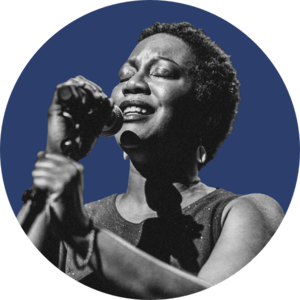Over the course of our series, you’ll hear first-hand accounts from African Americans who defined what everyday freedom meant during the Civil War and Reconstruction.
Historical archives don’t always paint a complete picture of a person’s life. With the exception of a few lengthy autobiographies, the stories we have about African Americans from these eras are most often snippets from newspaper articles, or letters without context, or testimonials given in court, or interviews conducted and “translated” by government agents.
But even when the ins and outs of someone’s whole life is a mystery, we know, from the records that do exist, that the Black people in our show played a defining role in making freedom real. So in these character spotlights, we’ll introduce you to people whose stories we weren’t able to include in full—or at all—in our narrative episodes. It’s important that you meet them and hear them tell as much of their stories as they can.
Spotlight: Susie King Taylor
View Transcript
Kidada Williams: Susie King Taylor was born in Georgia in 1848, to a long line of strong women who believed in and fought for freedom.
Susie King Taylor: My great-great-grandmother was 120 years old when she died. She had seven children, and five of her boys were in the Revolutionary War. She was so old she had to be held in the sun to help restore her vitality.
KW: When Susie was little, her grandmother sent her to a secret school for Black children to learn to read and write. Susie often forged passes for other enslaved people, giving them more freedom to move about, including to visit their family.
SKT: About this time I had been reading so much about the “Yankees”…I was very anxious to see them. I heard my parents say the Yankee was going to set all the slaves free. Oh, how those people prayed for freedom! I remember, one night, my grandmother went out into the suburbs of the city to a church meeting, and they were fervently singing this old hymn,
“Yes, we shall all be free, Yes, we shall all be free, Yes, we shall all be free, When the Lord shall appear…”
The police came in and arrested all who were there, saying: they were planning freedom and sang “the Lord,” in place of “Yankee” to blind anyone who might be listening! Grandmother never forgot that night…this was the last meeting she ever attended.
KW: In 1862, Susie’s family fled to Fort Pulaski in Tennessee. At the Union camp, she demonstrated her reading, writing, and sewing skills, and was put to work teaching children whose families escaped slavery and were living in the camp as refugees. She was fifteen years old, but already part of a network of Black women who advanced freedom and supported the War effort, even though they couldn’t enlist.
SKT: There are many people who do not know what some of the colored women did during the war. There were hundreds of them who assisted the Union soldiers by hiding them and helping them to escape. Many were punished for taking food to the prison stockades for the prisoners.
KW: Eventually, Susie mustered out with the 33rd US Colored Troops. She worked as a nurse, laundress, teacher, cook; really, doing anything that needed doing.
SKT: I assisted in cleaning the guns and used to fire them off, to see if the cartridges were dry, before cleaning and reloading, each day. I learned to handle a musket very well, and could shoot straight and often hit the target. I thought this great fun. I was able to take a gun all apart and put it together again.
KW: Though Susie served the Union army—risking death, capture, and re-enslavement every day for four years—she was never paid a dime.
SKT: At the close of the war, my husband and I returned to Savannah, a number of the comrades returning at the same time. A new life was before us now, all the old life left behind. After getting settled, I opened a school at my home…as there was not any public school for negro children. I had twenty children at my school, and received one dollar a month for each pupil. I also had a few older ones who came at night.
KW: That same year, Susie’s husband died. She had to give up teaching when a free school opened nearby and took all of her students. She went to work again as a laundress, and eventually moved north to Boston.
In so many ways, Susie’s story is remarkable. Her autobiography recounts at least three harrowing, near-death experiences in shipwrecks. She describes standing up to white Southern men after the war who refused to let her ride in the same train car.
In other ways, Susie’s story is pretty typical. She was a Black girl, then woman, with an idea of what her own freedom could, and should, look like, and she went after it; for herself, for her family, and for the future.
SKT: I must say a word on the general treatment of my race, both in the North and South, in this twentieth century. I wonder if our white fellow men realize the true sense or meaning of brotherhood? For two hundred years we had toiled for them; the war of 1861 came and was ended, and we thought our race was forever freed from bondage, and that the two races could live in unity with each other, but when we read almost every day of what is being done to my race by some whites in the South, I sometimes ask, “Was the war in vain? Has it brought freedom, in the full sense of the word, or has it not made our condition more hopeless?”
In this “land of the free” we are burned, tortured, and denied a fair trial, murdered for any imaginary wrong conceived in the brain of the negro-hating white man. They say, “One flag, one nation, one country, indivisible.” Is this true? Can we say this truthfully, when one race is allowed to burn, hang, and inflict the most horrible torture weekly, monthly, on another? No…It is hollow mockery.
I may not live to see it, but the time is approaching when the country will again have cause to repent for the blood it has shed of innocent black men, for their blood cries out for vengeance. …and I hope the day is not far distant when the two races will reside in peace…and we will sing with sincere and truthful hearts, “My country, ’tis of thee, Sweet land of Liberty, of thee I sing.”
KW: To hear more from Susie King Taylor about her time embedded with the Union army and her journey from being a secret student to a professional teacher, check out our upcoming episodes on enlistment and education.
Susie King Taylor’s story is excerpted from her autobiography, “Reminisces of My Life In Camp With the 33rd United States Colored Troops.” She was voiced by Richelle Claiborne.
Spotlight: Cyntha Nickols
View Transcript
Kidada Williams: After slavery, African Americans went to great lengths to find and claim their kin. In 1867, grandmother Cyntha Nickols sat down to write a letter to the government for help.
Cyntha Nickols: I am a Colored woman, former slave of a Mr. Sandy Spears of the parish of East Feliciana Louisiana…I am the mother of a woman, Dina, who is now dead. Dina had a child boy by the name Porter. Said Porter is now about Eleven years of age…
KW: With his mother dead and his father serving the US Army somewhere in California, Porter was essentially orphaned in the eyes of white officials.
So in swooped Sandy Spears, the Nickols’ former slaveowner. Spears made a custody claim to have Porter stay with him—and more importantly, work for him— until he became an adult.
CN: Mr. Spears has had the little boy Porter bound over to him so I am told by the agent of the Freedmen in this parish. I was not informed of this fact until after the matter of binding was consummated!
KW: Cyntha’s letter was an appeal to have Porter come live with her, instead. She turned to the Freedmen’s Bureau—the government organization meant to assist African Americans with food, housing, jobs, and legal support they needed to make new lives.
Unfortunately for Cyntha, Sandy Spears had the local Freedmen’s Bureau agent, James DeGrey, in his pocket. Both men knew that Cyntha was Porter’s grandmother. But both fought to keep Porter bound to work for Spears.
DeGrey favored apprenticing Black children to white employers. It made his job easier—if the kids were fed, clothed, housed, and schooled by their bosses, then the Freedmen’s Bureau wouldn’t have to mind them. And the white people got the unpaid labor they wanted. So DeGrey wrote his own letter to the regional office, undermining Cyntha as best he could.
CN: Said Porter is now…
James DeGrey: The boy, Porter…
CN: …about Eleven years of age…
JD: …is ten years of age. Spears raised him from a child.
CN: Mr. Spears I have known for many years…he is very old and infirm.
JD: Sandy Spears is, as stated, old. But not infirm.
CN: I do not think Mr. Spears a suitable person to control this boy. He is and has been for many years addicted to the use of ardent spirits. This fact, I do not like to mention. But truth requires me to speak.
JD: He is addicted to ardent spirits, but not more so than the
Spotlight: Ambrose Headen
View Transcript
Kidada Williams: During the Civil War and Reconstruction, African Americans seized education to help fortify their families’ freedom. Ambrose Headen was born enslaved in North Carolina and sold to Alabama when he was 16 years old.
Ambrose Headen: During all my slave life I never lost sight of freedom. It was always on my heart; it came to me like a solemn thought, and often circumstances much stimulated the desire to be free and raised great expectations of it. We slaves all knew when an Abolitionist got into Congress. We knew it when there was just one there, and we watched it all the way until there was a majority there. I don’t know hardly how we got that knowledge, but we always knew. We always called freedom “possum,” so as to keep the white people from knowing what we were talking about. We all understood it.
KW: Ambrose’s first master had sent him to train with a carpenter, and he was skilled by the time he got to Alabama.
AH: In 1852, some years before emancipation, my master signed $900—to be paid in work—towards building a Baptist College where we lived. He sent me to work out his subscription. I had four children of my own, and I thought that it was hard for me to work out this $900, when I could have no privilege of educating my own children.
KW: In 1865, Ambrose—along with William Savery and Thomas Tarrant, two other formerly enslaved men who helped build the College—went to a Freedmen’s convention in Mobile. There, they pledged:
AH: We regard the education of our children and youth as vital to the preservation of our liberties, and true religion as the foundation of all real virtue, and shall use our utmost endeavors to promote these blessings in our common country.
KW: They rushed home and, together, built a one-room schoolhouse out of abandoned lumber. Attendance skyrocketed.Meanwhile, the Baptist College they built for white students was struggling—it defaulted on its mortgage and was up for sale. The three men petitioned the local Freedmen’s Bureau agent, who appealed to the American Missionary Association, who bought the building.
In 1869, the school that Ambrose Headen had been contracted to build as an enslaved carpenter became Talladega College—Alabama’s oldest, private HBCU. Almost ten years later, Ambrose published a short autobiography for the American Missionary magazine:
AH: I little thought when I was building it that my children would ever graduate at this College, but God has turned things about, so that three of my children have graduated, and the fourth will graduate next June; so that when I worked out this subscription of my master, I was building a college for myself and my family…and now all my children are good scholars; one is a minister; one has charge of an academy; I have a good house of seven rooms, and eleven acres of land about it, besides a farm of 320 acres in the country.
When the college and the Congregational Church were planted here I joined the church, and have never been sorry for it. I love the missionary and would rather give all I have than to see it go down. I love to think of my son down in Selma preaching. There was quite a scare there about the yellow fever, and my son wrote me to know what he should do. I wrote him back, “to look to the Lord, and stand to his post.”
Nothing can illustrate the great change that has come over us, unless it is the change in passing from earth to heaven. You could see the force of this illustration if you knew our history—if you only knew the dark Egypt we have come through. I believe emancipation will work out as great things for us as it did for Israel.
KW: To hear more about the central role that schools and churches played in securing freedom and citizenship, check out our upcoming episodes on education and religion.
Ambrose Headen’s story was excerpted from an autobiography published in the American Missionary magazine and collected in John Blassingame’s “Slave Testimony.” He was voiced by Conrad Haynes.
Voice Actors

Richelle Claiborne
Voice of Susie King Taylor

Candice Holley
Voice of Cyntha Nickols

Gavin Wright
Voice of James DeGray

Conrad Haynes
Voice of Ambrose Headen
